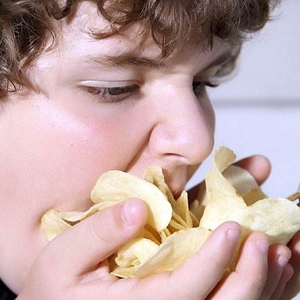Today we present a couple of closely related stories from the health and nutrition labs that bode well for the future of appetite suppression and weight control. We’re talking about cell-level mechanisms that help burn fat and control the urge to eat. One may lead to a cure for binge eating…
 Another pair of medical approaches to that could help even our poster girl
Another pair of medical approaches to that could help even our poster girl
or obesity, above, get her life and body in proper working order…
Signaling molecule boosts fat burning
We know that brown fat burns energy rather than simply storing it, like white fat does. Now a team at the University of Bonn, Germany, has identified a molecule, inosine, that stimulates brown fat and controls the generation of body heat. In human adults, brown fat activation appears to promote with cardio-metabolic health.
If a mechanism that transports inosine away from the fat cells is more active, the cells burn less fat. And vice-versa. Researchers say they’ve demonstrated that suppressing inosine transportation can keep mice lean and healthy in spite of being fed a high-fat diet.
“Nowadays, however, we’re toasty warm even in winter,” explains Dr. Alexander Pfeifer from the Institute of Pharmacology and Toxicology at the University of Bonn. “So our body’s own furnaces are hardly needed anymore. […] Research groups around the world are therefore looking for substances that stimulate brown fat and thus increase fat burning.”
Maybe a shortcut to a drug?
“There is a drug that was actually developed for coagulation disorders, but also inhibits the inosine transporter,” says Pfeifer. “We gave this drug to mice, and as a result they burned more energy.” Humans also have an inosine transporter. In 2 to 4 percent of all people, it is less active due to a genetic variation. “Our colleagues at the University of Leipzig have genetically analyzed 900 individuals,” Pfeifer explains. “Those subjects with the less active transporter were significantly leaner on average.”
The caveat is, Pfeiffer says more study is needed before such therapy is approved for common use.
No more binge eating?
A team at the University of Cologne has come up with a novel approach to controlling the urge to eat. Specifically the urge to eat too much; to keep on eating after you’re full.
They’ve found that a group of nerve cells in the hypothalamus (a well-known control centre in the brain) regulates the release of chemicals that control the excitability of nerve cells in the cerebral cortex, which stimulates food intake.
The theory is, if you can control the excitability of those cells, you can control the urge to eat too much. And therein lies a direct connection to the tendency to get fat.
The research is still in the early, mouse-based stages, but the team says indications are very good that the work will eventually lead to a powerful therapy for appetite suppression.
Hand-in-glove
The two discoveries we’ve spotlighted today could work hand-in-glove to help folks control their weight. As a result, they could more easily avoid the risks associated with overweight and obesity. And we all know excess weight is the scourge of modern society, causing or abetting many of our most pervasive diseases and conditions.
~ Maggie J.

